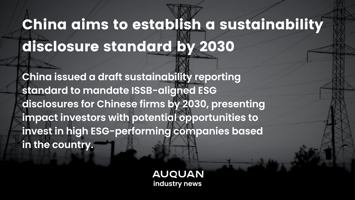The Sustainability Standards Board of Japan (SSBJ) has issued its first sustainability disclosure...
.png?height=200&name=News%20Cover%20(71).png)
The Chinese Ministry of Finance (MOF), jointly with nine other government agencies, released its first Corporate Sustainability Disclosure Standards—Basic Standards, as a part of its commitment to promote transparency and accountability in the country. The standards are intended to help companies disclose sustainability-related information, ensuring that their procedures align with legal requirements and global expectations.
The Corporate Sustainability Reporting Standards of China may be a pivotal shift for private market enterprises, asset managers, and impact investors by establishing a framework that aligns with global ESG benchmarks. This connection may change investment strategies and shift capital allocation towards companies that achieve these higher requirements.
Let’s explore the Corporate Sustainability Reporting Standards released by China in detail.
The corporate reporting standards are a set of rules or a regulatory framework for companies to increase their accountability and transparency. The finalized version of the standard builds on the Exposure Draft that was released in May 2024 by the MOF of China. The framework focuses on ensuring that companies in China disclose relevant sustainability-related information to promote better corporate responsibility and global competitiveness. It is a broader part of the strategy to create a unified national framework for corporate sustainability reporting in China, with the goal of its full implementation by 2030.
Professionals in private markets and asset management firms use Auquan's Intelligence Engine to automate research and monitoring for deal sourcing, borrow screens and due diligence, risk monitoring, sustainability, and compliance workflows.
Using advanced AI techniques, Auquan generates material insights on any company or issuer worldwide — public or private — instantaneously, tailored for your workflow.
Let's explore how Auquan can help you and your team eliminate tedious and time-consuming manual data work and focus more on what you do best.
Each day we spotlight under-the-radar investment themes and idiosyncratic risks pulled from our intelligence engine, often involving emerging markets, supply chain issues, ESG risks, and the impact of regulatory changes.
.png?height=200&name=News%20Cover%20(71).png)
The Sustainability Standards Board of Japan (SSBJ) has issued its first sustainability disclosure...
.png?height=200&name=News%20Cover%20(34).png)
The International Auditing and Assurance Standards Board (IAASB) has released the finalized version...

The China Ministry of Finance issued a draft sustainability reporting standard to establish a...
Each day we spotlight under-the-radar investment themes and idiosyncratic risks pulled from our intelligence engine, often involving emerging markets, supply chain issues, ESG risks, and the impact of regulatory changes.

15 minutes to see what’s possible when manual work disappears.
Interested in working at Auquan? Click here
The Chinese Ministry of Finance (MOF), jointly with nine other government agencies, released its first Corporate Sustainability Disclosure Standards—Basic Standards, as a part of its commitment to promote transparency and accountability in the country. The standards are intended to help companies disclose sustainability-related information, ensuring that their procedures align with legal requirements and global expectations.
The Corporate Sustainability Reporting Standards of China may be a pivotal shift for private market enterprises, asset managers, and impact investors by establishing a framework that aligns with global ESG benchmarks. This connection may change investment strategies and shift capital allocation towards companies that achieve these higher requirements.
Let’s explore the Corporate Sustainability Reporting Standards released by China in detail.
The corporate reporting standards are a set of rules or a regulatory framework for companies to increase their accountability and transparency. The finalized version of the standard builds on the Exposure Draft that was released in May 2024 by the MOF of China. The framework focuses on ensuring that companies in China disclose relevant sustainability-related information to promote better corporate responsibility and global competitiveness. It is a broader part of the strategy to create a unified national framework for corporate sustainability reporting in China, with the goal of its full implementation by 2030.
Professionals in private markets and asset management firms use Auquan's Intelligence Engine to automate research and monitoring for deal sourcing, borrow screens and due diligence, risk monitoring, sustainability, and compliance workflows.
Using advanced AI techniques, Auquan generates material insights on any company or issuer worldwide — public or private — instantaneously, tailored for your workflow.
Let's explore how Auquan can help you and your team eliminate tedious and time-consuming manual data work and focus more on what you do best.
Each day we spotlight under-the-radar investment themes and idiosyncratic risks pulled from our intelligence engine, often involving emerging markets, supply chain issues, ESG risks, and the impact of regulatory changes.
.png?height=200&name=News%20Cover%20(71).png)
The Sustainability Standards Board of Japan (SSBJ) has issued its first sustainability disclosure...
.png?height=200&name=News%20Cover%20(34).png)
The International Auditing and Assurance Standards Board (IAASB) has released the finalized version...

The China Ministry of Finance issued a draft sustainability reporting standard to establish a...
15 minutes to see what’s possible when manual work disappears.
Interested in working at Auquan? Click here
